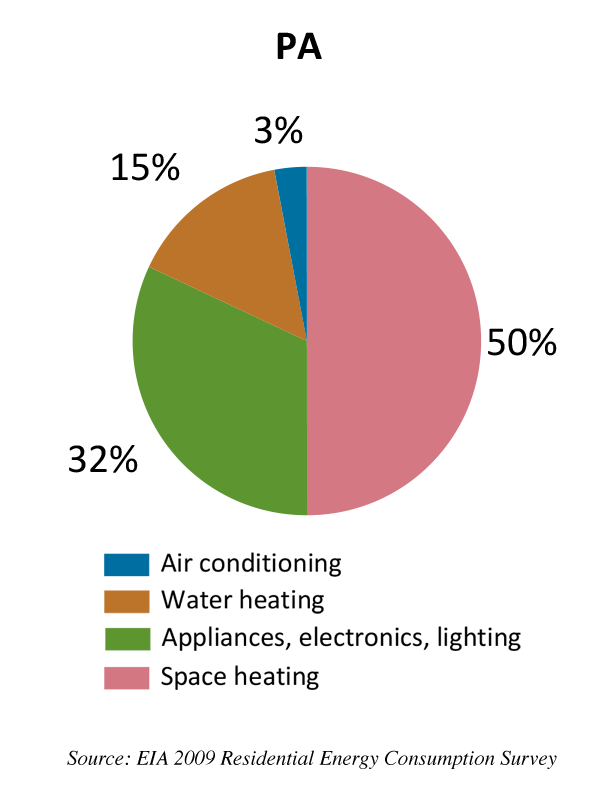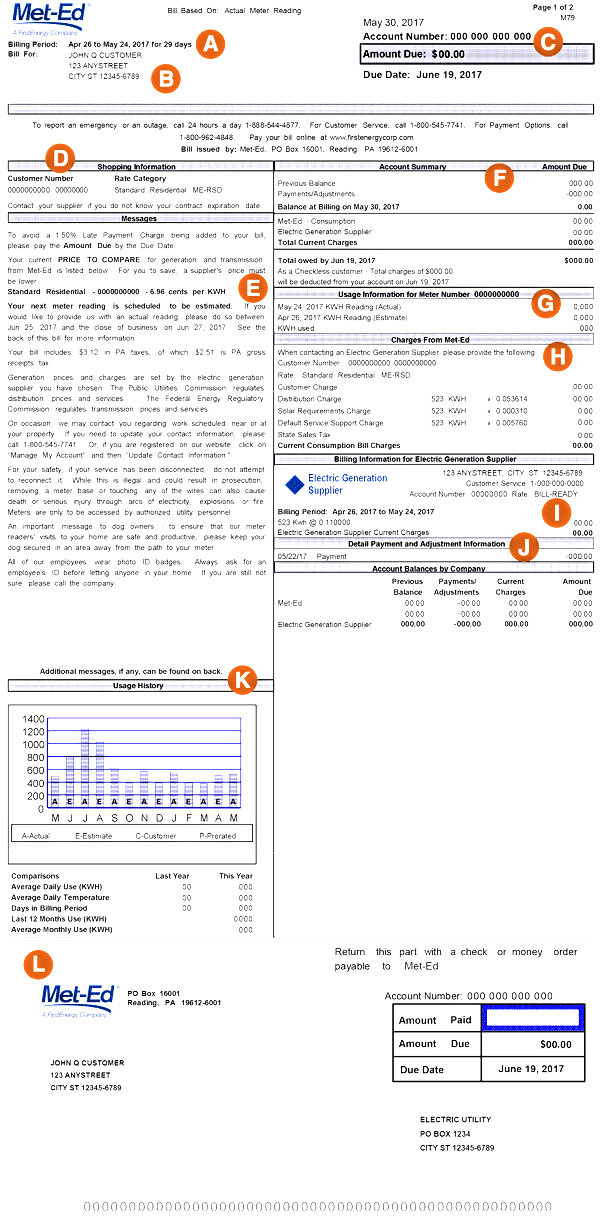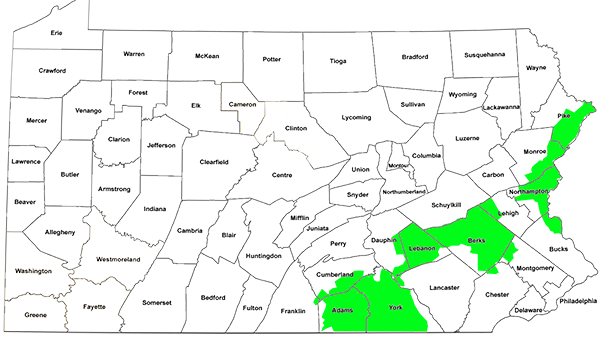Find More Electricity and Natural Gas Plan Options
Switch And Save
Pay Your Bill
Recommended Met-Ed Electricity Plans for York
Met-Ed Service Territory
Compare Met-Ed Electricity Rates
Compare alternative supplier electricity rates in the Met-Ed service area.
- Enter zip code.
- Select "electricity".
- Choose "residential" or "business".
- Click "Shop for Rates".
In Pennsylvania, electricity utility service territories may overlap in some zip codes. If the tool reports that it has found more than one serving your zip code, don't worry! Just choose your local utility from those listed.
You'll then get to see the listing of all the energy suppliers' plans available in your area, along with rates, term lengths, and links to more detail information.
How to Start New Met-Ed Service
Getting set up with Met-Ed is easy and convenient. Just visit the Met-Ed web site and simply fill in the online Start Service form.
Start requests take at least 2 days to process and First Energy will send you an email confirming your start date.
Customers should call the Met-Ed Contact Center if they need their service turned on sooner.
Be ready to supply:
- Service Address: The address where you want your service turned on or switched.
- The start date for electricity service.
- Personal Information: You will need your name, phone number, email address, and your Social Security Number. These will be required.
- Met-Ed will do a soft credit check to determine if a deposit is required.
Will I Need to Pay a Deposit?
Credit Rating -- Met-Ed has the right to check your credit history and level of credit risk to determine whether a security deposit is necessary. Other factors include whether the customer was previously disconnected or has unpaid energy bills.
TIP -- Be sure to unfreeze your credit. If you have frozen your credit with any of the major credit agencies, you will need to have it temporarily unfrozen before you submit a new service request.
Pay a Deposit -- Met-Ed must notify you in writing within 3 business days about the specific reasons why you are required to pay a security deposit. PA law states that deposits cannot be greater than an estimated two months usage.
Customers have 21 days after the utilty sends the deposity request notification to make a payment. However, customers have three months to pay the full deposit. The utlity can hold the deposit for 24 months. If the customer pays their bill in full and on time for 12 consecutive months, the deposit will earn interest.
Customers also have the right to use a guarantor who is a credit-worthy customer with Met-Ed and can pay your bills if you fail to do so.
Understand Met-Ed Delivery and Supply Charges
In Pennsylvania, residential customers pay for both the cost to deliver their electricity as well as for the amount of electricity supply that they use.
- Delivery Charges are fixed rate charges (tariffs) representing the cost of transmitting electricity to your home via Met-Ed's powers. The charges cover the Met-Ed local infrastructure operating costs, maintenance, and ensures them a profit. Other usage-based charges are small costs from riders to fund projects, cover fees, etc. Met-Ed's delivery charges must be approved by the Pennsylvania Public Utilities Commission (PAPUC). All Met-Ed customers pay the same set Delivery rates no matter who supplies their energy.
- Supply Charges represent the price for the amount of electricity that you use. Met-Ed customers can choose the "Price to Compare" (PTC) for their electricity supply. However, because of Pennsylvania's Energy Choice program, customers are free to also choose energy from competitive retail electricity suppliers.
Understand Met-Ed PTC Charges
When deregulation began in Pennsylvania, all utilities that wanted to participate in consumer choice had to sell off their generators. However, the PAPUC requires these utilities to provide electricity supply at a default rate to customers in their service territory who don't shop for a retail supplier. As a result, these utilities must purchase their electricity supply for the default rate from generator companies.
The PAPUC oversees Met-Ed's default service rates. Met-Ed's supply rate represents generation supply costs that are passed without mark up directly through the utility onto their customers. This default supply rate is also called the "Price to Compare" or PTC.
Price to Compare (PTC)
The PTC default rate represents the actual price (both generation and transmission) the utility pays for the electricity. It not only includes the generator company's price for making the electricity but also the cost to transmit it from power stations over high tension power lines to Met-Ed's local electrical switch yards. From there, the electricity is distributed throughout the Met-Ed local electrical grid for delivery to homes.
In Pennsylvania, First Energy's utilities set PTC rates by holding auctions to line up their electricity supplies. Auctions are held four times a year to cover four delivery periods. Consequently, Met-Ed's PTC rates change every March 1, June 1, September 1, and December 1. When the auctions are completed, the PAPUC must approve the prices for both the generation supply and transmission.
For customers, it means these electricity rates can vary seasonally; low some months, higher the next.
Met-Ed Current PTC Residential Rate:
12.965 cents per kWh, expires 5/31/2026
NOTE: There are approximately thirty-five borough-owned public power systems in Pennsylvania. These purchase energy for their local residents. Many prohibit residents from shopping for their own provider. If you live in one of these communities, check with your local government to learn more.
How Much Do Met-Ed PTC Charges Cost?
The DOE EIA estimates that the average Pennsylvania residence uses an average of 864 kWh each month. Therefore, an average PTC bill roughly breaks down like this:
| Rate per 864 kWh Used | Monthly Customer Charge | Total | |
|---|---|---|---|
| PTC Supply Rate | 12.965 cents | 0 | $112.02 |
| Monthly Distribution Charges (excluding riders) | $0.048 per kWh | $11.25 | $52.72 |
| Total Bill | $164.74 |
Understand Pennsylvania Energy Choice
Pennsylvania electric consumers are free to choose their own competitive retail electricity supplier. These alternative suppliers shop deals with different producers on the wholesale market to offer competitive rates. As such, their rates are not controlled by PAPUC the same way that utilities are. This way, retail suppliers are able to offer competitively priced fixed rate plans for a variety of term lengths.
Though it can seem confusing, shopping electricity plans is an easy process. The trick is finding the one that meets your needs. That's why retail energy suppliers in Pennsylvania offer two types of plans:
- Fixed Rates have their price rate set for the same price over the term of the contract. Customers can count on stable energy rates on plans lasting from 6 to 36 months. However, many fixed rate plans come with early cancellation fees for breaking a contract early.
- Variable Rates Want to avoid getting tied to an electricity plan for months or years? Then choose a variable plan. Variable plan rates on these contracts can change from month to month depending on the price of the electricity supply. But while there's no contract, there's nothing to prevent your rate from going up one month or down the next. However, these plans don't have any termination fees and this allows customers the flexibility to shop for new rates and switch to better deals without paying any penalty.
Your Energy Usage and Understanding Your Met-Ed Bill

While your energy usage habits are unique to you, any Pennsylvania native will tell you that winters can be bitterly cold and summers can be hazy, hot, and humid. While most PA homes rely on natural gas for heating, roughly 1.6 million (29%) of homes in the state use electricity.
- Approximately one third (32%) of home electricity usage goes to electronics, lighting, appliances, and air conditioning.
- Pennsylvania residents spend on average 5% of their annual energy costs on air conditioning. Half of PA households have central AC.
- The remainder of energy use goes to water heating, refrigeration, lighting, electronics, clothes dryers, cooking, and small appliances.
Want to learn more about your home energy usage? Met-Ed customers can track 12 months of their electric usage plus other relevant information on each monthly bill or by logging on to your First Energy account.
The best way to cut your electricity bill is to reduce your usage:
- Seal your doors and windows against winter and summer drafts. Not only does it keep out the cold or hot air but it also reduces the amount of mold, pollen, and other allergens getting into your home.
- Add insulation to your attic, basement, and duct work.
- Install a programmable or smart thermostat. Programming it to set-back the temperature when you're away or inactive can improve your home's energy efficiency and help cut your electric bills.
Your utility company can provide a wealth of resources and offers programs to help you improve your home's energy performance.
Understand Your Met-Ed Bill
Your Met-Ed bill contains many details that can be confusing to customers. But there's lots of useful information to help you better understand your usage and rate. Below, we break down the most important items on a sample Met-Ed Electric bill.
Met-Ed Sample Bill

- A, B, & C: Bill Overview. It includes your address and personal account number with Met-Ed, the billing period, the amount due, and the date that the bill is due.
- D & E: Messages and current PTC rate. Here you find important notifications from Met-Ed as well as current Price to Compare rate offered by Met-Ed.
- F: Account Summary shows the amounts of any unpaid balances, current Met-Ed distribution charges, current supply charges, the total bill and the due date.
- G: Meter Summary: This shows the usage information measured by the electric meter at your address.
- H: Charges from Met-Ed include the type of rate you are being charged, the monthly customer charge, the distribution charges, and the total.
- I: Charges from Electric Generation Supplier show the name and address of your electricity supplier, their base rate charged, and the total supplier charges due.
- J: Account Balances by Company lays out the amounts that have been paid or are owed to Met-Ed and your supplier.
- K: Shows your usage history per bill over the course of the past year to help you compare your energy use over time and understand trends.
- L: Payment Stub. Just detach and return with your payment. It also includes your account number, amount paid, amount due, and the due date.
Compare MetEd Rates
Met-Ed Coupons, Energy Promotions, Discounts, Rebates and Promo Codes
As your local electric utility, Met-Ed offers several rebate and energy efficiency programs to help customers save money off their monthly bill by upgrading their home's energy performance. Some programs also offer money-saving incentives while others could make paying your monthly bills much easier during those expensive winter months.
| Program Name | Program Type | Benefit |
| Appliance and HVAC Rebates Program | Energy Efficiency Rebate Program | Pennsylvania residential customers of Met-Ed, Penelec, Penn Power and Met-Ed can now take advantage of rebates on the purchase of ENERGY STAR certified appliances and HVAC systems.
|
| Appliance Turn-In Program | Energy Efficiency Rebate Program | Recycle your old working fridge or freezer and get $50. Plus, you save money on your electricity bill.
|
| Energy Efficient New Homes | Energy Efficiency Rebate Program | Pennsylvania Energy Efficient New Homes Program provides financial incentives for construction of more energy-efficient single-family, multifamily and manufactured homes. Entire new homes can also receive the ENERGY STAR certification. Energy efficient homes not only reduce energy costs but also increase comfort. Homes qualified through the FirstEnergy New Homes Program achieve energy efficiency through established, reliable building techniques. |
| Home Energy Analyzer | Energy Efficiency Rebate Program | First Energy's Home Energy Analyzer is a simple, convenient tool you can use to save energy and money. Best of all, it's free. Just register online with your account number and zip code. |
| Residential Energy Audit Program | Energy Efficiency Rebate Program | First Energy customers can sign up for the low cost Home Energy Audit Program. A certifeid energy audiotr will:
|
| Lighting Discounts and Water Heating Rebates | Energy Efficiency Rebate Program | First Energy's customers can take advantage of instant discounts on the purchase of qualified ENERGY STAR?® certified bulbs. Customers can also receive an instant $500 discount at participating retailers when they purchase a qualified heat pump water heater. |
| Met-Ed Payment Arrangements | Bill payment assistance | Met-Ed offers payment arrangements to allow residential customers to pay their account balance in monthly installments. These installments are billed along with your current monthly charges and both must be paid on time, in full each month.
|
| WARM Program | Residential Energy Efficiency | Helps eligible Met-Ed customers using more than 375 kWh per month a way to reduce their electric bills through home weatherization and conservation. |
| Medical Certificate | Bill payment assistance | This will delay termination of service for up to 30 days if you are eligible for a medical certificate or renewal, and if you or anyone living in your home is seriously ill. A licensed physician, physician's assistant or nurse practitioner must notify Met-Ed in writing. |
| LIHEAP Cash and Crisis Grants | Bill payment assistance | LIHEAP usually opens in early November and closes in early April. The program is available to eligible customers whose income is 150% of the Federal Poverty Level or below. |
| Dollar Energy Fund | Bill payment assistance | Met-Ed partners with Dollar Energy Fund to provide help to limited-income households.
|
| Met-Ed Customer Assistance & Referral Evaluation Service (CARES) program | Bill payment assistance | There are no income guidelines to qualify for the CARES Program. You may qualify for CARES if you:
|
| Pennsylvania Customer Assistance Program (PCAP) | Bill payment assistance | Pennsylvania Customer Assistance Program (PCAP) helps residential customers maintain electric service and eliminate their past-due balance. To apply. Customers will need to supply the following information:
Participants are billed approximately the same amount each month in order to manageably reduce their debt. Apply through the Dollar Energy Fund. |
Read Met-Ed Reviews
Since Met-Ed serves a large east coast market segment, southeast Pennsylvania residential customers can get a better picture of how good a job it does by comparing it to similar large-scale utilities. Met-Ed is not accredited with the BBB but the utility rated third highest in J.D. Power's 2021 utility residential customer satisfaction study. The utility also rated well in Escalent's 2021 Utility Trusted Brand & Customer Engagement™: Residential study.
| PA Energy Ratings Score | Better Business Bureau | J.D. Power 2021 Electricity Utility Study | Escalent 2021 Utility Study |
|---|---|---|---|
| N/A | Not Accredited | 760of 1000 pts | 696of 1000 pts |
How Do I Get the Cheapest Met-Ed Rate?
Shopping for a new Met-Ed Customer Choice Plan can seem bewildering at first. Once you understand how it works, though, it's an easy and straightforward process. That said, you should have these three things with you when you shop for electricity.
- Your current bill. Your past usage per billing period can help you estimate a how much a plan might cost you each month.
- The current Met-Ed PTC and expiration date. Knowing the current Met-Ed supply price lets you compare rates offered by retail energy suppliers. This way, you can get a better feel for what suppliers are offering, for how long, and if any of their incentives make their price work for your family's need.
- Your Met-Ed of Pennsylvania customer account number. This 12 digit number is located on your bill. Having it handy lets you sign up with a retail supplier right away.
Met-Ed Shopping Questions
The best way for a PA energy customer to avoid making a bad choice is to ask the right questions. That way, you can learn exactly the information that can save you money. When you shop for electricity service in Pennsylvania, always be sure to ask these important questions:
- Is the rate variable or is it fixed?
- Is the rate competitive with the current Met-Ed supply rate?
- How long does the plan contract term run?
- Does the plan's contract term last longer than Met-Ed's PTC rate?
- Does the plan include any recurring monthly charges?
- Does the plan have an early cancellation fee?
- Does the supplier offer any customer incentives or rewards programs?
- What happens when the contract expires?
Other Commonly Asked Pennsylvania Electricity Questions:
Who bills me? Met-Ed sends a single bill that outlines and adds up your monthly charges.
What are the Terms of Service? In PA, Customer Choice Plans must include Terms of Service that explain and identify specific charges and any fees a customer will face when they sign up for an electricity plan. Not all suppliers have the same terms. That's why all Pennsylvania energy choice customers should read and understand the terms of service and contract summary for any plan they are interested in before they sign on to the plan.
What are early termination fees? Switching retail suppliers before a contract ends can involve paying early termination fees. These can take a big chomp out of your checking account you if choose to switch retail providers before your plan contract ends.
Where can I find more information on my usage? Met-Ed customers can request 12 months of their energy usage free of charge. This is most easily available through your Met-Ed online account.
Compare Met Ed Electricity Rates in Your Area
Bill Questions? Electricity Out? Contact Met-Ed!
Having problems or interruptions with your Met-Ed electricity? Here's the proper people to call.
Met-Ed Billing Problems
The PAPUC requires all PA public utilities to offer "budget billing" where annual electricity costs are averaged out over the cost of the year. This ensures that customers aren't presented with unexpectedly high bills at peak times.
- First thing to do is contact Met-Ed. If you are having trouble paying your monthly bill call Met-Ed's Customer Service: 1-800-545-7741. Have your account number ready.
- Need extra time to pay your energy bill? Customers can apply to the Customer Assistance Program (CAP) by calling Customer Service or by applying on-line.
- Residential Customers aged sixty (60) years of age or older or a residential customer receiving Social Security or an equivalent monthly pension payment can request to extend the due date of such customer's bill from 20 days to 30 days.
Met-Ed Emergencies and Outages
All power lines are extremely dangerous! Never attempt to move a downed power line by yourself. Call 911 and then notifiy Met-Ed.
- Report safety hazards involving power lines immediately to Met-Ed at 1-888-LIGHTSS (1-888-544-4877).
- You can also report downed lines or outages at Met-Ed's website.
- Check Met-Ed's current electric outages as they are being repaired.
Met-Ed Service Area Providers
| Company | Rating | Phone |
|---|---|---|
| Constellation | (4.2/5) |
866-773-8761 |
| Frontier Utilities | (3.8/5) |
866-775-9922 |
| Energy Harbor | (3.6/5) |
866-632-6308 |
| APG&E | (3.4/5) |
866-751-6415 |
| Santanna Energy Services | (3.1/5) |
866-607-2101 |
| XOOM Energy | (3/5) |
|
| Think Energy | (3/5) |
866-763-5041 |
| American Power & Gas | (2.9/5) |
866-763-3786 |
| Provision Power & Gas | (2.6/5) |
866-929-2842 |
| Direct Energy | (2.5/5) |
866-646-0311 |
| NRG Home | (2.4/5) |
|
| CleanSky Energy | (2.3/5) |
866-751-2986 |
| Major Energy | (2.1/5) |
866-756-8272 |
| Green Mountain Energy | (2.1/5) |
|
| Symmetry Energy Solutions | (2/5) |
888-549-1087 |
| Clearview Energy | (2/5) |
|
| National Gas & Electric | (2/5) |
|
| PAG&E | (2/5) |
|
| NextEra Energy Services | (2/5) |
855-639-8091 |
| Public Power | (1.4/5) |
866-752-4690 |
| Verde Energy | (1.2/5) |
866-953-8160 |
| Spring Power & Gas | (0/5) |
866-759-4976 |
| 22 results | ||
Pennsylvania Zip Codes with the Cheapest Electricity Rates
The Latest Met-Ed News
Save Now With the Lowest Electricity Rates in York Lock in the lowest priced short term electric plans in York and still avoid paying high Met-Ed PTC rates this summer. We show you how! 2025... [read more]
Save Now with Cheap Priced 12 Month Plans Get the most savings on your PA electricity rates when you shop 12 month plans priced to beat Met-Ed's higher PTC rate. This year has been brutal for... [read more]
Price to Compare Could Continue to Rise Check out which summer electricity plans totally beat your utility's Price to Compare! Shop now to lock in the cheapest price per kWh for your... [read more]





